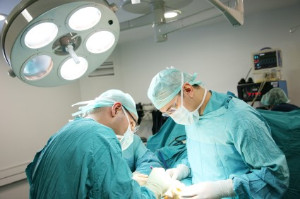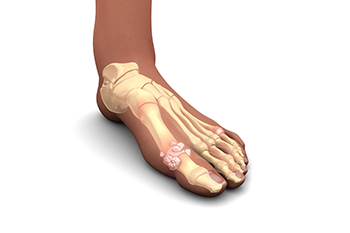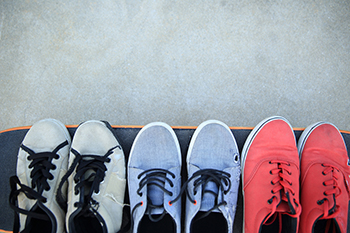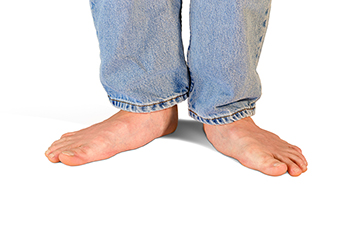Items filtered by date: April 2023
Is Midfoot Surgery Right for Me?

Patients may feel stiffness in the middle of their feet. This may be indicative of midfoot arthritis and can be caused by degeneration. Osteoarthritis and rheumatoid arthritis often fall into this category and may cause extreme pain and discomfort. It may occur from a previous foot fracture, or possibly from an abnormal foot structure. The pain can be chronic, and lifestyle changes may be made that may help to provide temporary relief. Some people opt to have midfoot fusion surgery performed, with the goal of having improved function and decreased pain. This type of surgery can be successful in restoring normal walking and may be helpful in providing stability to the arch. The majority of people who suffer from midfoot arthritis may be eligible to have a midfoot fusion operation. However, there may be existing medical conditions, such as an active infection or overall poor health, that prevent people from undergoing this type of surgery. If you have midfoot pain, it is strongly suggested that you are under the care of a podiatrist who can determine if surgery is the right decision for you.
Foot surgery is sometimes necessary to treat a foot ailment. To learn more, contact Glenn Aufseeser, DPM of Lakewood Foot and Ankle Specialists. Our doctor will assist you with all of your foot and ankle needs.
When Is Surgery Necessary?
Foot and ankle surgery is generally reserved for cases in which less invasive, conservative procedures have failed to alleviate the problem. Some of the cases in which surgery may be necessary include:
- Removing foot deformities like bunions and bone spurs
- Severe arthritis that has caused bone issues
- Cosmetic reconstruction
What Types of Surgery Are There?
The type of surgery you receive will depend on the nature of the problem you have. Some of the possible surgeries include:
- Bunionectomy for painful bunions
- Surgical fusion for realignment of bones
- Neuropathy decompression surgery to treat nerve damage
Benefits of Surgery
Although surgery is usually a last resort, it can provide more complete pain relief compared to non-surgical methods and may allow you to finally resume full activity.
Surgical techniques have also become increasingly sophisticated. Techniques like endoscopic surgery allow for smaller incisions and faster recovery times.
If you have any questions please feel free to contact our offices located in Lakewood and Manchester Township, NJ . We offer the newest diagnostic and treatment technologies for all your foot and ankle needs.
Who Gets Gout?

The pain from the arthritic condition, known as gout, is generally found in the joints of the big toe. It happens due to excess uric acid in the bloodstream that converts into crystals. People who eat large amounts of specific foods such as shellfish and red meat or that drink excessive amounts of alcohol may be prone to developing gout. Additionally, people with high blood pressure, diabetes, or heart disease may develop gout, and immediate care is often needed. It may also occur for genetic reasons, and common symptoms of this condition can include extreme pain. Patients may notice the affected joints are tender and warm when touched. Prevention methods can include drinking plenty of water daily and consuming nutrient-rich foods. If you have developed gout, it is strongly suggested that you are under the care of a podiatrist who can effectively diagnose and treat this condition.
Gout is a painful condition that can be treated. If you are seeking treatment, contact Glenn Aufseeser, DPM from Lakewood Foot and Ankle Specialists. Our doctor will treat your foot and ankle needs.
What Is Gout?
Gout is a form of arthritis that is characterized by sudden, severe attacks of pain, redness, and tenderness in the joints. The condition usually affects the joint at the base of the big toe. A gout attack can occur at any random time, such as the middle of the night while you are asleep.
Symptoms
- Intense Joint Pain - Usually around the large joint of your big toe, and it most severe within the first four to twelve hours
- Lingering Discomfort - Joint discomfort may last from a few days to a few weeks
- Inflammation and Redness -Affected joints may become swollen, tender, warm and red
- Limited Range of Motion - May experience a decrease in joint mobility
Risk Factors
- Genetics - If family members have gout, you’re more likely to have it
- Medications - Diuretic medications can raise uric acid levels
- Gender/Age - Gout is more common in men until the age of 60. It is believed that estrogen protects women until that point
- Diet - Eating red meat and shellfish increases your risk
- Alcohol - Having more than two alcoholic drinks per day increases your risk
- Obesity - Obese people are at a higher risk for gout
Prior to visiting your podiatrist to receive treatment for gout, there are a few things you should do beforehand. If you have gout you should write down your symptoms--including when they started and how often you experience them, important medical information you may have, and any questions you may have. Writing down these three things will help your podiatrist in assessing your specific situation so that he or she may provide the best route of treatment for you.
If you have any questions, please feel free to contact our offices located in Lakewood and Manchester Township, NJ . We offer the newest diagnostic and treatment technologies for all your foot care needs.
It's Time for Beautiful Feet
Finding Your Shoes for Jazzercise

If you enjoy jazzercise, wearing comfortable and supportive shoes is important. It would be nice if they were attractive shoes, but that should take a back seat to be good for your feet and the activity you are participating in. Attention should be paid to arch support, so feet pronate or strike the floor and correctly distribute weight. If you are at a crossroads regarding the size of the jazzercise shoe, always go a half size up, as the foot will inch forward during high-impact exercise. Shoes should be flexible between the heel and the ball of the foot to accommodate the turns, twists, and jumps done in jazzercise. Also, look for lightweight, breathable shoes that provide support but do not restrict mobility for this activity. If you want assurance in selecting the proper shoes for jazzercise and your feet, it is suggested that you consult with a podiatrist who can help guide you.
It is important to find shoes that fit you properly in order to avoid a variety of different foot problems. For more information about treatment, contact Glenn Aufseeser, DPM from Lakewood Foot and Ankle Specialists. Our doctor will treat your foot and ankle needs.
Proper Shoe Fitting
Shoes have many different functions. They cushion our body weight, protect our feet, and allow us to safely play sports. You should always make sure that the shoes you wear fit you properly in order to avoid injuries and deformities such as: bunions, corns, calluses, hammertoes, plantar fasciitis, stress fractures, and more. It is important to note that although a certain pair of shoes might be a great fit for someone else, that doesn’t mean they will be a great fit for you. This is why you should always try on shoes before buying them to make sure they are worth the investment. Typically, shoes need to be replaced ever six months to one year of regular use.
Tips for Proper Shoe Fitting
- Select a shoe that is shaped like your foot
- Don’t buy shoes that fit too tight, expecting them to stretch to fit
- Make sure there is enough space (3/8” to ½”) for your longest toe at the end of each shoe when you are standing up
- Walk in the shoes to make sure they fit and feel right
- Don’t select shoes by the size marked inside the shoe, but by how the shoe fits your foot
The shoes you buy should always feel as good as they look. Shoes that fit properly will last longer, feel better, and improve your way of life each day.
If you have any questions, please feel free to contact our offices located in Lakewood and Manchester Township, NJ . We offer the newest diagnostic and treatment technologies for all your foot care needs.
Flat Foot Diagnosis

People who are lacking an arch in their feet are known to have flat feet. All babies are born with flat feet, and the arch generally develops in the teenage years, but this may not happen in some adults, possibly due to genetic factors or if they have endured a foot injury. Additionally, there may be existing Achilles tendon conditions or muscle problems that may lead to having flat feet. This ailment is easily diagnosed by undergoing a physical examination in addition to having an X-ray performed. It is beneficial for patients with flat feet to wear supportive shoes and refrain from wearing shoes that lack arch support, such as flip-flops. Adults who have flat feet may need additional support, and this may include wearing custom-made orthotics. If you are experiencing aches and pains from having flat feet, it is suggested that you confer with a podiatrist who can help you with relief techniques.
Flatfoot is a condition many people suffer from. If you have flat feet, contact Glenn Aufseeser, DPM from Lakewood Foot and Ankle Specialists. Our doctor will treat your foot and ankle needs.
What Are Flat Feet?
Flatfoot is a condition in which the arch of the foot is depressed and the sole of the foot is almost completely in contact with the ground. About 20-30% of the population generally has flat feet because their arches never formed during growth.
Conditions & Problems:
Having flat feet makes it difficult to run or walk because of the stress placed on the ankles.
Alignment – The general alignment of your legs can be disrupted, because the ankles move inward which can cause major discomfort.
Knees – If you have complications with your knees, flat feet can be a contributor to arthritis in that area.
Symptoms
- Pain around the heel or arch area
- Trouble standing on the tip toe
- Swelling around the inside of the ankle
- Flat look to one or both feet
- Having your shoes feel uneven when worn
Treatment
If you are experiencing pain and stress on the foot you may weaken the posterior tibial tendon, which runs around the inside of the ankle.
If you have any questions please feel free to contact our offices located in Lakewood and Manchester Township, NJ . We offer the newest diagnostic and treatment technologies for all your foot and ankle needs.

